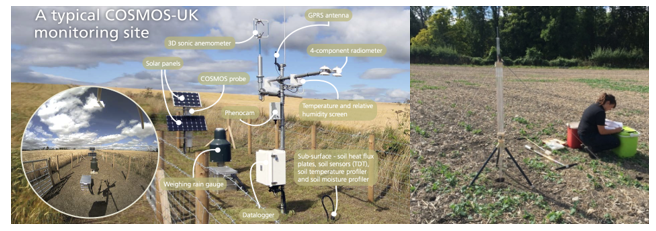Lead Supervisor: Alejandro Dussaillant, UK Centre for Ecology and Hydrology (UKCEH)
Email: aledus@ceh.ac.uk
Co-supervisor: Anne Verhoef, Department of Geography and Environmental Science, University of Reading; James Blake, UKCEH; Matt Brown, UKCEH
The project will benefit from detailed soil surveys done by LANDWISE NFM project (2019-2022), where a baseline of soil structure and hydraulic property data was gathered in several sites of the Upper Thames, revisiting those sites at year 0 and year 3, having thus three snapshots in time to characterise soil dynamics during a 5-year total time span. Additionally, a water retention capacity will be measured at the plot scale using a COSMOS rover during dry seasons (estimating minimum soil moisture for a circa 300m radius footprint). Also the project will profit from a LANDWISE site which contains an eddy-flux tower since 2017 to perform water and energy budgets that will allow a longer-term look, albeit at point scale, of water retention capacity. While the ongoing EU-funded SpongeScapes project will provide additional field data to expand analysis.
To assess the relevance of soil dynamics, the changes in soil structure and hydraulic properties will be parameterised in Land Surface Models, from simple screening (intended for crop productivity forecasting) to more complex (State-of-the-Art), and compared to data from eddy flux towers, as well as simulations assuming constant soil structure and hydraulic properties.
The research will be relevant to those involved in hydrologic extremes management and model development and, in particular, those with an interest in Working With Natural Processes (WWNP), NbS and NWR, who aim to mitigate the effects of changes in land use/management, climate and water resources. The proposal builds on the current skills and experience of its applicants from UKCEH and UoR and will form the basis for partnerships in e.g., soil hydrology. The project will allow the student to work with and further develop innovative new survey and modelling tools and techniques, and demonstrate advanced skills in analysing and presenting new spatio-temporal datasets.
The work will greatly improve understanding of the link between spatial and temporal aspects of soil water retention capacity, and related soil process dynamics. Ultimately, this can help deliver improved NFM/NbS measures for benefit of people and the environment.
Candidates for this project should have a minimum of an Upper Second Class Honours degree or equivalent in environmental science, engineering, physics, geography, mathematics, ecology or a similar discipline, and ideally an interest in both soil hydrology and catchment hydrology. The candidate will have an interest in catchment water resource management, be willing to undertake field work and have good numerical and computing skills. Good communication skills will be essential to engage with stakeholders (potentially including citizen scientists). The student will be based at UKCEH Wallingford.
Dr Alejandro Dussaillant (UKCEH) has supervised one PhD student (plus two more currently) and 7 MPhil students to completion. He has also supervised many UG and MSc dissertation projects in Chile and UK. Many of these involved soil hydrology monitoring and modelling, including future climate scenario simulations.
Dr James Blake (UKCEH) has previously supervised MSc dissertation projects.
During her time at UoR (i.e., since July 1999) Prof Anne Verhoef has successfully supervised 24 PhD students to completion, and she currently has 4 PhD students. She has also supervised a large number of UG and MSc dissertation projects; many of those involved modelling of the soil-plant-atmosphere system and/or the soil water balance.
The student will be part of Verhoef’s research group and interact with the other PhD students and PDRAs at group meetings as well as attending relevant wider UoR-based Research Group meetings (e.g., Soil Biogeochemistry Group, Water@Reading).
The training will be split between UKCEH and the UoR, giving the student ample exposure to research institute and HEI environments. Training will be given in field-based instrumentation deployment and maintenance (e.g., use of COSMOS rover), data analysis, and statistical and process-based modelling allowing development of numerical modelling skills and data visualization methods to view and disseminate the measurements.
The student will also be encouraged and supported in engaging with stakeholders (environmental regulators and advisory bodies) to promote the potential of closer consideration of natural processes in catchment management.

Left: COSMOS-UK station (https://uk-scape.ceh.ac.uk/our-science/projects/COSMOS-UK). Right: Infiltration measurements
Training Opportunities
Besides the training opportunities mentioned in 3a above, the ongoing SpongeScapes EU-funded project provides access to a network of international partners (Netherlands, France, Germany, Poland, Slovenia, Italy, Greece), case study sites including agricultural sites, innovative monitoring and modelling tools, and the SpongeScapes PhD and practitioner networks.
Student Profile
Candidates for this project should have a minimum of an Upper Second Class Honours degree or equivalent in environmental science, engineering, physics, geography, mathematics, ecology or a similar discipline, and ideally an interest in both soil hydrology and catchment hydrology. The candidate will have an interest in catchment water resource management, be willing to undertake field work and have good numerical and computing skills. Good communication skills will be essential to engage with stakeholders (potentially including citizen scientists).
For home candidates, the project will be based at UKCEH, Wallingford. For international candidates, this project will be hosted at the University of Reading under lead supervision of Professor Anne Verhoef.

